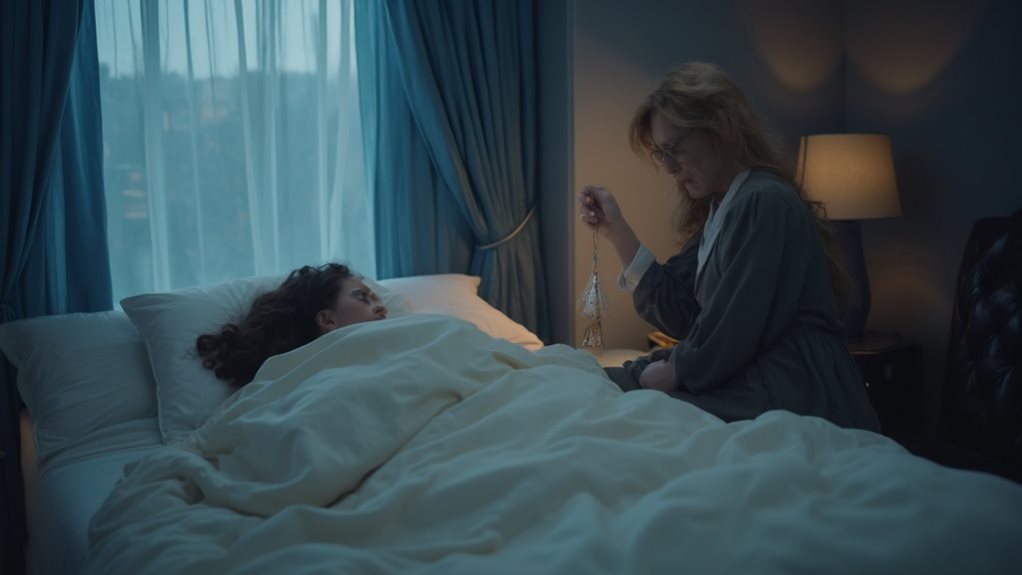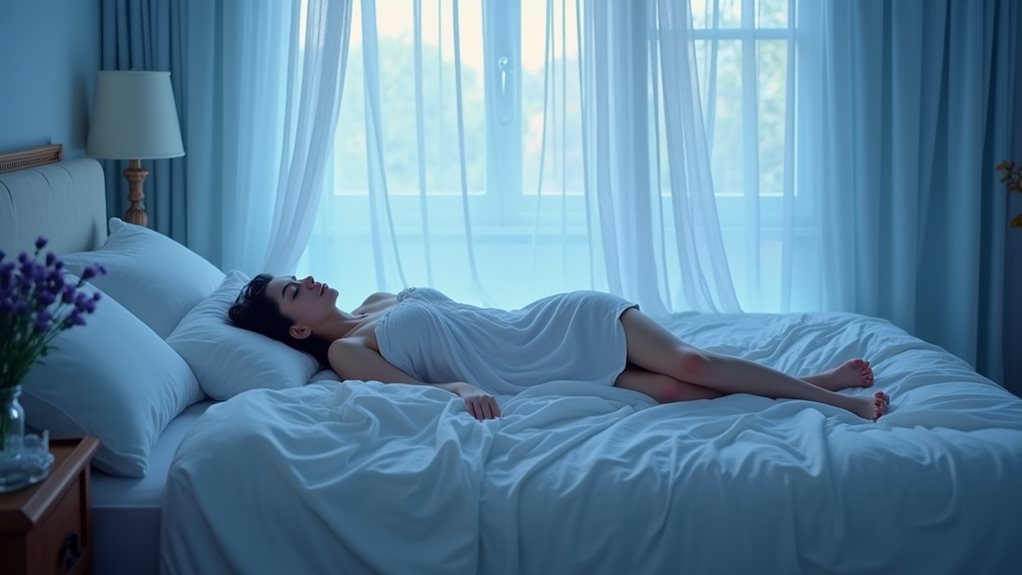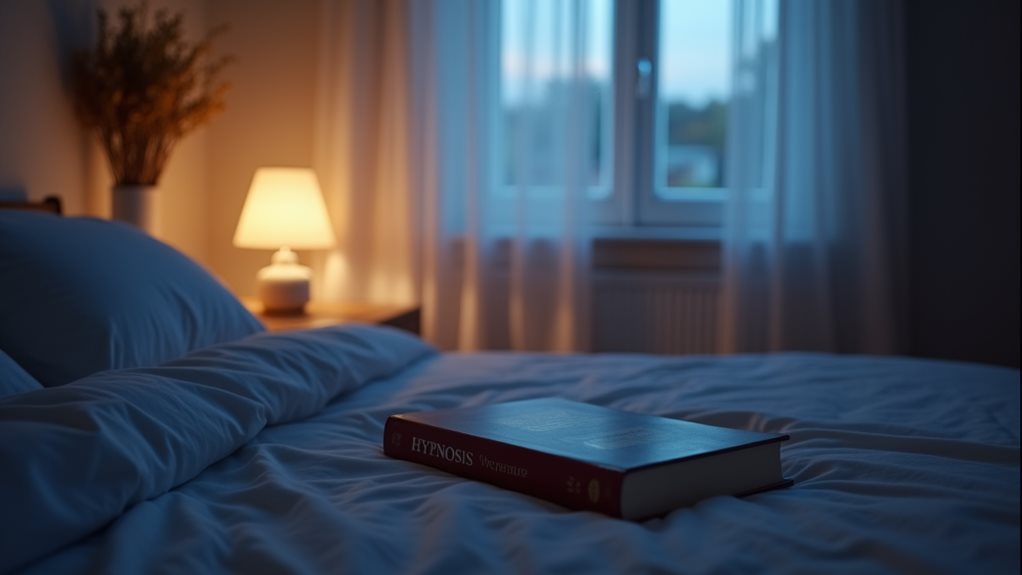
Hypnosis serves as a transformative tool for alleviating sleep anxiety, focusing on cultivating a deep state of relaxation necessary for restorative sleep. Utilizing hypnotic suggestions, it efficiently quiets mental chatter and guides the mind towards tranquility, addressing the root causes of sleep disturbances. Techniques like deep breathing and progressive muscle relaxation further enhance the therapeutic effect by promoting mental calm and a stronger mind-body connection. This holistic approach offers long-term benefits, setting the foundation for healthier sleep cycles and improved well-being.
Key Takeaways
- Hypnosis induces deep relaxation, quieting mental chatter and preparing the mind for sleep.
- Hypnotic suggestions target root causes of sleep anxiety, promoting peaceful sleep.
- Techniques such as deep breathing and muscle relaxation are integrated to enhance the relaxation response.
- Hypnosis strengthens the mind-body connection, improving overall sleep quality and emotional regulation.
- Long-term hypnosis use builds resilience against stressors and improves sleep hygiene.
Exploring the Root Causes of Sleep Anxiety
Why do so many individuals lie awake at night, besieged by anxiety that prevents restful sleep? The root causes of sleep anxiety are complex, often stemming from deep-seated fears, unresolved conflicts, and daily stressors.
Key sleep triggers include workload pressures, interpersonal tensions, and health concerns. Recognizing these triggers is essential in managing sleep disturbances effectively.
Furthermore, habitual anxiety patterns exacerbate insomnia, where anticipatory anxiety about sleeplessness perpetuates the cycle. By identifying and understanding these underlying factors, one can begin to develop targeted strategies for alleviating sleep anxiety, thereby paving the way for more restorative sleep.
The Relaxing Power of Hypnosis for Sleep
As many grapple with the elusive quest for restful sleep, hypnosis emerges as a potent tool to release the relaxing power needed to combat sleep anxiety.
This therapeutic technique leverages hypnotic suggestions to trigger a profound relaxation response in individuals. By guiding the mind into a deeply relaxed state, hypnosis helps to quiet the mental chatter that often fuels sleep disturbances.
The process encourages the subconscious to embrace calming thoughts, thereby paving the way for a peaceful night's sleep. Through these targeted suggestions, hypnosis efficiently addresses the root causes of sleep anxiety, fostering an environment conducive to rest and rejuvenation.
Techniques That Promote Deep Relaxation and Mental Calm

Building on the foundation of hypnotic relaxation addressed earlier, it is beneficial to explore specific techniques that foster deep relaxation and mental calm.
Deep breathing exercises, integral to this process, involve slow, deliberate inhalations and exhalations. This method effectively reduces physiological stress responses, aligning the body with a state of calm.
Additionally, progressive muscle relaxation is another vital technique. It entails systematically tensing and then relaxing different muscle groups, which not only alleviates physical tension but also enhances mental tranquility.
Together, these practices form a powerful duo in the arsenal against sleep disturbances, promoting a deeper, more restorative sleep.
Strengthening the Mind-Body Connection Through Hypnosis
Enhancing the mind-body connection through hypnosis provides a profound pathway to improved sleep quality and overall wellness.
By integrating mindfulness practices within the hypnotic sessions, individuals learn to focus their attention and gain awareness of their physical state, promoting emotional regulation. This deliberate focus helps in managing stress responses and reducing nighttime anxiety, vital factors in achieving restorative sleep.
Hypnosis also fortifies this connection by encouraging a harmonious dialogue between the mind and the body, making it easier to release tension and foster a peaceful sleep environment.
Consequently, this strengthened connection aids in the holistic betterment of an individual's health.
Sustaining Better Sleep: Long-Term Benefits of Hypnosis

Hypnosis not only strengthens the mind-body connection but also lays the foundation for sustained improvements in sleep quality. By addressing the root causes of sleep disturbances, such as anxiety, hypnosis helps cultivate effective sleep hygiene practices and anxiety management techniques.
This results in long-term benefits that extend beyond mere sleep improvement.
- Enhanced Sleep Hygiene: Establishing routines that promote consistent, restful sleep.
- Effective Anxiety Management: Reducing nighttime anxiety that can disrupt sleep.
- Resilience Against Stress: Building mental resilience to better handle future stressors affecting sleep.
These benefits collectively contribute to improved overall well-being and a healthier sleep cycle.
Frequently Asked Questions
How Quickly Can I See Results From Hypnosis for Sleep?
Results from hypnosis techniques for sleep can vary; some individuals may notice improvements in sleep patterns within a few sessions, while others might need longer to experience significant changes due to personal psychological factors.
Are There Any Side Effects of Using Hypnosis for Sleep?
Hypnosis for sleep generally presents minimal side effects. Potential risks may depend on individual susceptibility and session duration. It's advisable to consult a professional to tailor approaches and mitigate any adverse effects.
Is Hypnosis for Sleep Safe for Children?
Despite concerns, child hypnosis for sleep is generally considered safe when conducted by trained professionals. This sleep therapy can offer a non-invasive option to improve sleep patterns and reduce anxiety in children.
How Often Should I Undergo Hypnosis Sessions for Sleep Improvement?
For ideal sleep improvement, frequency recommendations for hypnosis sessions vary. Typically, weekly sessions are advised initially, with session duration lasting about an hour. Adjustments depend on individual progress and specific therapeutic goals.
Can Hypnosis for Sleep Help With Nightmares or Sleepwalking?
Ironically, while nightmares paint nights with terror, hypnosis promises a canvas of calm. It effectively offers nightmare alleviation and sleepwalking therapy, rewiring disturbing patterns to foster peaceful slumber and enhanced nocturnal tranquility.
Conclusion
In summary, hypnosis presents a profound tool for enhancing sleep quality by addressing its psychological roots. By harnessing techniques such as guided imagery and progressive muscle relaxation, it fosters a deep mind-body synergy. Isn't it worth exploring how this gentle, therapeutic approach could be your key to overcoming sleep anxiety and achieving sustained, rejuvenating rest? Embracing hypnosis could open a world of peaceful nights and energized mornings, greatly improving your overall well-being.





